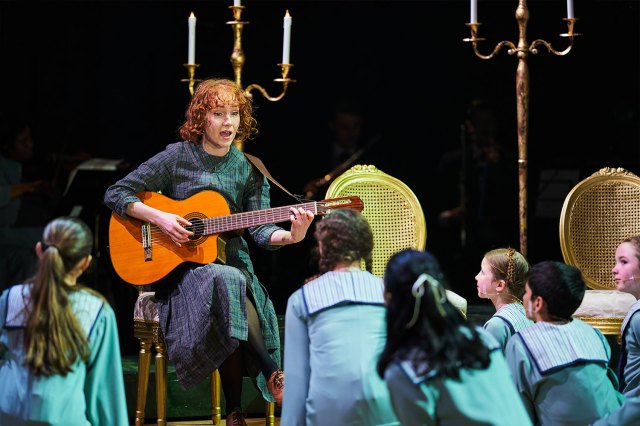The Sound of Music at Pitlochry Festival Theatre – review
Director Elizabeth Newman has solved a problem like Maria with an overwhelming sense of love for the material

If ever there was a theatre in which to see The Sound of Music – a show where the hills are, famously, alive–- then it’s the one in Pitlochry. Scotland’s “Theatre in the Hills” is one of the loveliest places to see any play, and if the Perthshire Highlands might not bear that close a resemblance to the Austrian Alps, then they still make for a stunning backdrop.
Not that The Sound of Music needs any special pleading, of course. It’s the indestructible duo of Rodgers and Hammerstein at their most iron-clad, with its beautiful story of a nun who finds love with the father of the children to whom she acts as governess, and some of musical theatre’s most famous numbers thrown in. Maria brings sunshine, light and music back into a family made desolate through loss, and it’s made all the more bizarre by the fact that it’s true. Add in the lashings of nostalgia that almost everyone in the audience must, surely, feel for a time when they first watched the movie as a kid, and you’re onto a winner before anyone has sung a note or strummed a guitar.
It stands or falls on the quality of the central performance, however, and Pitlochry’s production has a diamond asset in Kirsty Findlay’s Maria. Not only does she sing all those big numbers with brio, but she acts Maria’s transition from novice to wife with remarkable convincingness. Her gestures and mannerisms transform from the overgrown child who leaves the abbey to the wise mother who has to find a way to save her family from the Nazis. Interestingly, she’s the only character who retains her Scottish accent, an effect which is initially slightly jarring alongside the RP of almost everyone else, but the audience’s ear quickly tunes into what must be an intentional choice.
Ali Watt can’t quite match her as Captain Von Trapp. He sings beautifully, but there’s a slight woodenness to his stage persona that doesn’t sufficiently mellow when his disciplinarian tendencies turn to love. No such criticism for Sally Cheng, who plays Liesl the eldest daughter with ingenuous energy and a lovely sense of a girl about to become a young woman. Elliot Gooch’s goofy but boundary-pushing Rolf is great alongside her, too; an energetic performance that reminds you that this show is as much his coming-of-age story as it is hers.
The rest of the children, all double-cast, do just as good a job with their parts, and the other adults are all well-taken, including Christian Edwards’ amiably cynical Max and Kate Milner-Evans’ powerhouse Mother Abbess, though Hannah Baker’s Elsa is a little too unremittingly serious. The cast also double as the orchestra, slipping in and out of the onstage band as and when they’re required to, which is dashed impressive, even if it’s oddly comical watching the chorus of nuns sing while brandishing violins and a glockenspiel.
Ruari Murchison’s sets do a lot with a little. The main set is nothing more than a revolving staircase with a few props pushed in from the side, and the backdrop suggests the Alps through a jagged black and white line. It all lends itself very well to the show’s many ensemble scenes: the only time you notice any limitations is when some more spectacle would have been welcome, such as the wedding scene, or the act one party at the Von Trapp house.
Those smaller scale interactions, however, play to the strengths of director Elizabeth Newman, who adores the show, and whose affection for it comes out in the tenderness and attention to detail that she lavishes on every scene. Little movements, such as the children’s softening body language or the shared silence as Maria and the Captain dance, speak volumes, and illustrate people growing together and developing individually while the national drama of the Anschluss rages around them. This is Newman’s final show as Pitlochry’s artistic director before she moves on to run Sheffield Theatres, and she leaves on a high. Alan Cumming, her celebrity replacement, takes over in January 2025, but if he can live up to the consistency and quality of the theatrical community that Newman has created, then he’ll be doing well.















